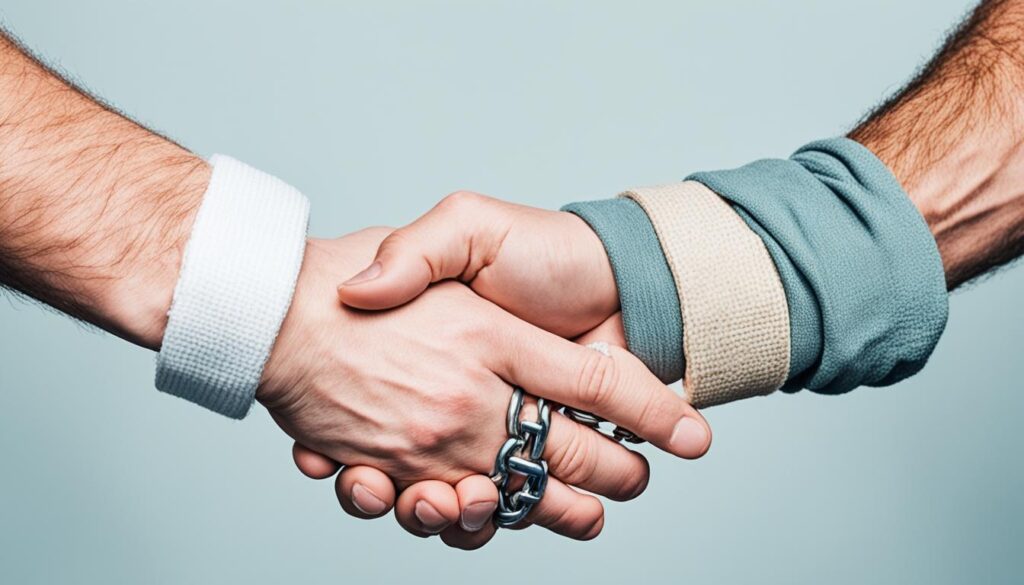“The greatest healing therapy is friendship and love.” – Buddha
Whether you’re struggling to mend a broken friendship or repair a rift that has formed, there are effective steps you can take to fix a friendship. By following these strategies, you can rebuild trust, heal the damage, and create a stronger bond with your friend. In this article, we will explore practical advice and heartfelt strategies to help you mend your friendship effectively.
Key Takeaways:
- Repairing a friendship requires time, effort, and patience.
- Open and honest communication is crucial in rebuilding trust.
- Practicing compassion and forgiveness can help heal the damage.
- Mindfulness and self-reflection contribute to personal growth and repairing friendships.
- Approach the process with an open heart and a genuine desire to repair the bond.
The Importance of Friendships
Friendships play a vital role in our lives. They provide emotional support, companionship, and a sense of belonging. Friends are there for us during both the good times and the bad times, and they lend a listening ear and offer valuable advice. Maintaining healthy friendships is essential for our overall well-being and happiness. When a friendship is broken, it can cause pain and feelings of loss. However, it is important to recognize the significance of friendships and make efforts to fix them.

Friendships offer numerous benefits that contribute to our well-being. They provide a support system during challenging times, helping us navigate through life’s ups and downs. Having a close-knit group of friends provides us with a sense of belonging, acceptance, and understanding. Knowing that there are people who care about us and genuinely have our best interests at heart can greatly enhance our overall happiness and mental well-being.
Additionally, maintaining friendships allows us to share experiences, create lasting memories, and engage in enjoyable activities together. Friends provide a sense of companionship and can amplify the joy we find in our daily lives. They offer a different perspective, bring new ideas and insights, and challenge us to grow and expand our horizons. Through friendships, we can discover new interests, explore new possibilities, and build a network of support that enriches our lives.
Friendships also have a positive impact on our physical health. They can reduce stress levels, lower the risk of developing mental health conditions, and boost our immune system. The social connections we form with friends have been linked to increased longevity and improved overall well-being. The support and care we receive from friends play a crucial role in helping us navigate various challenges, promoting resilience and emotional well-being.
Despite the importance of friendships, it’s not uncommon for conflicts and misunderstandings to arise. However, recognizing the significance of maintaining these connections and making efforts to fix broken friendships is vital. By investing time and energy into repairing these relationships, we can rebuild trust, heal emotional wounds, and restore the bond. Restoring a friendship not only benefits the individuals involved but also contributes to a healthier and more connected community.
Steps to Mend a Friendship
When it comes to fixing a friendship, there are several steps you can take to rebuild trust and mend the bond. Firstly, it is essential to let the dust settle and allow time for emotions to calm down. This can help prevent further damage and provide a clearer perspective.

Secondly, open and honest communication is crucial. Clear the air, express your feelings, and listen to your friend’s perspective without judgment. Apologize for any part you played in the conflict and be willing to forgive.
It is also important to give your friend space and time to heal. Allow them to process their emotions and thoughts without pressure. This will enable both of you to approach the situation with a renewed mindset.
To rebuild trust, consistency is key. Show your friend that they can rely on you by keeping your promises, being dependable, and following through on your commitments. By being consistent in your actions, you can demonstrate your dedication to the friendship and help restore their confidence in you.
Respecting boundaries is another critical aspect of repairing a friendship. Take the time to understand and honor your friend’s boundaries. This shows that you are attentive to their needs and validates their feelings.
Table: Strategies for Repairing a Friendship
| Step | Description |
|---|---|
| 1 | Allow emotions to calm down |
| 2 | Engage in open and honest communication |
| 3 | Apologize and be willing to forgive |
| 4 | Give space and time for healing |
| 5 | Show consistent support and reliability |
| 6 | Honor boundaries |
Remember, rebuilding a friendship takes effort from both parties involved. Be patient, understanding, and committed to the process. With time and dedication, you can heal the damage and create a stronger, more resilient bond with your friend.
The Power of Compassion and Forgiveness
Compassion and forgiveness hold immense power in the realm of friendships. Drawing inspiration from the teachings of Buddhism, these qualities can significantly contribute to the process of fixing and healing broken bonds within our relationships.
Practicing compassion involves stepping into your friend’s shoes and making a genuine effort to understand their feelings and perspectives. It requires empathy and kindness, even if you do not fully agree with their actions. By embracing compassion in your friendships, you create a safe space for open communication and connection.
Forgiveness, too, is an essential component in mending a friendship. It enables you to let go of grudges and resentments, freeing up space for healing and rebuilding trust. Embracing forgiveness allows both parties to move forward without the weight of past conflicts, fostering a stronger and healthier bond.

Through the teachings of Buddhism, we learn that practicing compassion and forgiveness is not only beneficial for ourselves but also for the relationships we hold dear. By infusing these virtues into our friendships, we cultivate a deeper understanding, empathy, and respect for one another. These qualities create a solid foundation for growth, resilience, and love within our connections.
The Power of Compassion and Forgiveness in Action
To better understand the impact of compassion and forgiveness in friendships, let’s consider a real-life scenario:
| Scenario | Reaction without Compassion and Forgiveness | Reaction with Compassion and Forgiveness |
|---|---|---|
| Your friend unintentionally cancels plans last minute | You become angry, feeling neglected and unimportant | You understand that your friend may have had a genuine reason for canceling and offer your understanding and support |
| Your friend says something hurtful during an argument | You hold onto the hurt, resenting your friend and distancing yourself | You practice forgiveness and have an open conversation, expressing your feelings while allowing space for your friend to share their perspective |
| Your friend makes a mistake or wrongs you | You harbor anger, seeking revenge or cutting ties | You practice compassion, understanding that everyone makes mistakes, and work on rebuilding trust through forgiveness and open communication |
By choosing compassion and forgiveness, we can transform challenging situations into opportunities for growth, repair, and strengthened friendships. The power of these qualities lies in their ability to foster understanding, acceptance, and love, creating a harmonious path forward.
Cultivating Mindfulness and Self-Reflection
Mindfulness and self-reflection are powerful practices that can greatly contribute to the process of fixing a friendship. Mindfulness involves being fully present in the moment and consciously aware of your thoughts, emotions, and actions. By practicing mindfulness, you can develop a deeper understanding of yourself and your friend, fostering empathy and compassion in the relationship.
Self-reflection, on the other hand, allows you to examine your own behaviors and attitudes, taking responsibility for any role you may have played in the breakdown of the friendship. It’s an opportunity to honestly assess your actions and thoughts, identifying areas where personal growth is needed. Through self-reflection, you can learn from past mistakes, gain valuable insights, and enhance your ability to repair and strengthen the bond with your friend.
Incorporating mindfulness and self-reflection into your journey of fixing a friendship can bring about transformative changes. By cultivating self-awareness and gaining a deeper understanding of your own emotions and motivations, you can navigate the complexities of the relationship more effectively. These practices allow you to approach the process with empathy, patience, and a genuine desire for personal and relational growth.
The Benefits of Mindfulness and Self-Reflection in Friendships
- Promotes deeper self-awareness and understanding
- Fosters empathy and compassion towards your friend
- Helps identify and modify harmful patterns of behavior
- Encourages personal growth and development
- Enhances communication and conflict resolution skills
- Builds resilience and adaptability in relationships

Practicing mindfulness and self-reflection in your efforts to mend a friendship opens up a path towards personal growth, healing, and the rebuilding of trust. Through these practices, you can embark on a journey of self-discovery and transformation, ultimately creating a stronger and more meaningful connection with your friend.
| Steps to Cultivate Mindfulness and Self-Reflection in Friendships | Benefits |
|---|---|
| Carve out dedicated time for self-reflection | Allows for self-awareness and personal growth |
| Practice mindfulness meditation | Enhances present-moment awareness and empathy |
| Engage in active listening during conversations | Improves communication and strengthens connections |
| Keep a journal to reflect on thoughts and emotions | Aids in processing and gaining insights |
| Seek feedback from trusted friends or mentors | Provides external perspectives and guidance |
Conclusion
Repairing a friendship is a process that requires time, effort, and patience. However, the rewards of rebuilding bonds and healing friendships are immeasurable. By following the steps outlined in this article, and embracing the teachings of compassion, forgiveness, mindfulness, and self-reflection, you can effectively mend your broken friendship.
Approach this journey with an open heart and a genuine desire to repair the bond. Be willing to communicate honestly and listen to your friend’s perspective. Apologize for any role you played in the conflict and be ready to forgive. Give your friend the space and time they need to heal.
Remember, fixing a friendship is not about just going back to how things were. It’s about rebuilding a bond that is stronger and healthier than before. With determination and understanding, you can heal the damage and cultivate a lasting friendship that will stand the test of time. So take the first step today and start repairing your relationship with your friend.
FAQ
How do I fix a broken friendship?
To fix a broken friendship, it is important to let the dust settle and allow time for emotions to calm down. Open and honest communication is crucial to clear the air and express your feelings. Apologize for any part you played in the conflict and be willing to forgive. Give your friend space and time to heal. Focus on rebuilding trust by showing consistent support, being reliable, and honoring boundaries.
Why are friendships important?
Friendships play a vital role in our lives as they provide emotional support, companionship, and a sense of belonging. Friends are there for us during both the good times and the bad times, lending a listening ear and offering valuable advice. Maintaining healthy friendships is essential for our overall well-being and happiness.
What are the steps to mend a friendship?
The steps to mend a friendship include letting emotions settle, communicating openly and honestly, apologizing for your part in the conflict, forgiving, giving your friend space and time to heal, and focusing on rebuilding trust through consistent support, reliability, and respecting boundaries.
How does compassion and forgiveness help in fixing a friendship?
Compassion involves putting yourself in your friend’s shoes, understanding their feelings and perspectives, and showing empathy and kindness towards them. Forgiveness is crucial in mending a friendship as it helps create space for healing and rebuilding trust. Both compassion and forgiveness are essential in restoring the bond and repairing the damages.
How can mindfulness and self-reflection help in fixing a friendship?
Mindfulness involves being present in the moment, fully aware of your thoughts, emotions, and actions, and fostering empathy and understanding towards your friend. Self-reflection allows you to examine your own behaviors and attitudes, identifying areas where you may have contributed to the breakdown in the friendship. Both mindfulness and self-reflection enhance personal growth and improve your ability to repair and strengthen the bond with your friend.
What is the key to fixing a friendship?
The key to fixing a friendship is approaching the process with an open heart, willingness to communicate, and a genuine desire to repair the bond. It requires time, effort, patience, compassion, forgiveness, mindfulness, and self-reflection. By embracing these factors, you can mend the broken friendship effectively and create a stronger, healthier relationship.

